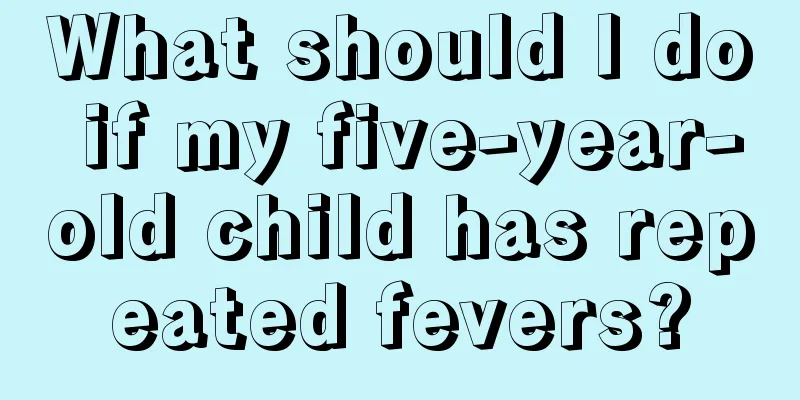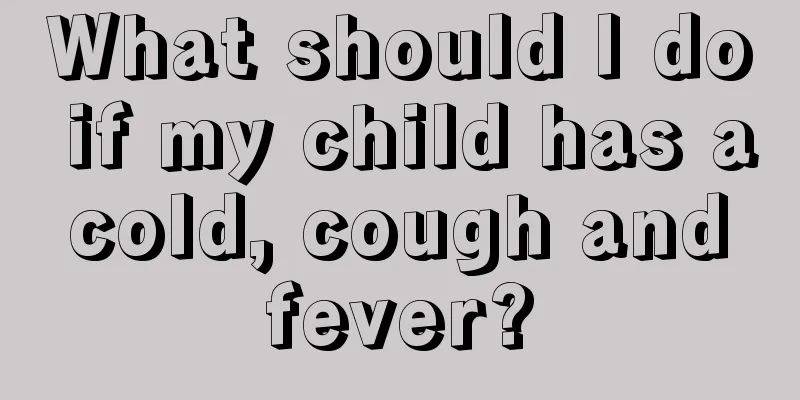What should I do if my five-year-old child has repeated fevers?

|
Fever is the most common disease among children. Because children's bodies are relatively weak, they are very susceptible to diseases when the temperature changes greatly. Many diseases can cause fever. I hope everyone can always pay attention to their children's health to avoid worsening of the disease. So, what should we do if a five-year-old child has repeated fevers? Should he take antipyretics from the beginning? How should parents take care of sick children? According to statistics, children who go to the hospital due to fever generally account for 10% to 15% of children's outpatient visits. It’s no wonder that when seeing the child’s face flushed red and his body burning, even the calmest parents would panic. What should I do if my child has a fever? Is reducing the fever the best way? What should parents do? If your child has a fever, don't rush to cool him down First of all, don’t rush to reduce the fever, but find out the cause of the child’s fever. Fever is not a disease, it is like an alarm bell for the body, reminding you that something abnormal is happening inside the body. At the same time, fever is also a defense measure of our body against pathogenic microorganisms. To a certain extent, appropriate fever is beneficial to enhance the body's resistance and eliminate pathogens. So if the child does not have a high fever, do not rush to reduce the fever immediately, otherwise it will hide the real cause of the disease. There are many causes of fever in children. Upper respiratory tract infection, gastroenteritis, tonsillitis, pneumonia and all infectious diseases may cause fever symptoms. In addition, babies under one year old may also develop fever due to urinary tract infections, gastrointestinal diseases, and hand, foot and mouth disease. In many cases, a doctor must be consulted to find out the real cause of the fever. Bacteria or viruses, the two types of infections require completely different medications Generally speaking, bacteria and viruses are the most common sources of infection for babies. The treatment methods for fever caused by these two situations are completely different. If it is a bacterial infection, the treatment effect will be very good as long as the right antibiotics are chosen. If it is a viral infection, there is currently no specific medicine. You can take Virus Ling, Isatis Root Granules, Honeysuckle, etc. The fever caused by viral infection will subside on its own after a certain period of time. You should not try to treat the fever by all means and use all kinds of medicine at once. If your baby has a fever, don't mix medicines together Whether to give children antipyretics requires weighing the pros and cons. Of course, medicine can improve the child's condition and make the baby feel more comfortable; but it is also likely to bring some side effects. The World Health Organization recommends that no antipyretic drugs should be used for infants under 2 months old. In general, antipyretic medications should be used only for children with high fevers. The method and dosage of taking must be done according to the doctor's instructions. We recommend giving your child antipyretics only when the body temperature exceeds 38.5 degrees Celsius. If your child has a history of high fever convulsions, you may give him or her antipyretics when the temperature reaches 38 degrees Celsius. It should be noted in particular that many parents often mix different types of antipyretic drugs for their children. Some impatient parents, when the fever does not go down after half an hour of oral medication, add suppositories. However, the durability of various drugs is different, and mixing them may cause overlapping drug effects. As a result, the fever subsided too quickly and the body temperature dropped rapidly to below 36 degrees Celsius. New problems arise. Parents can choose an antipyretic drug and become familiar with its dosage and interval so that they can use it with ease. After the above introduction, I believe that parents have a correct understanding of what to do when a five-year-old child has repeated fever. When a child is sick, parents must not panic, because panic is not conducive to taking care of the child. It is best to calm down and take the child to the Children's Hospital for examination. Remember not to use medicine casually, because casual medication will not do any good for the child's recovery. |
<<: Causes of white tongue coating in infants
>>: Can fatigue cause fever in children?
Recommend
The child is three years old and still can't speak
Some children start talking and walking when they...
What to do if the newborn baby has severe milk regurgitation
In our lives, many newborns will spill milk when ...
How long should children take zinc supplements?
For children, they should pay attention to zinc s...
What are the symptoms of eczema in children
Because children's bodies are still in a deve...
What causes red bumps on newborn baby's face?
Some newborn babies develop red bumps on their fa...
What should students eat when they stay up late?
Students nowadays are working particularly hard, ...
What are the main functions of eye health exercises for children?
Children's health exercises include many aspe...
Why does the baby suddenly cry when he falls asleep?
Some babies cry a lot at night. The constant cryi...
What should I do if my 1-year-old baby suddenly cries while sleeping?
We often say that every baby is a little angel se...
What causes anemia in children?
Many people do not have a clear understanding of ...
What are the benefits of walnut oil for babies?
Walnut oil is oil made from walnuts. Because waln...
Kids cough recipes
Many parents are worried when their children have...
Baby walks unsteadily and legs are weak
Learning to walk is an indispensable stage in a b...
What kind of lighting is good for children's eyes?
Nowadays, we find that more and more children are...
White spots on newborn's head
I believe that most parents will find that their ...









